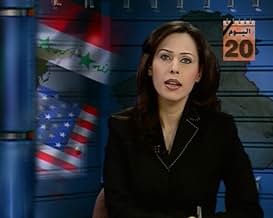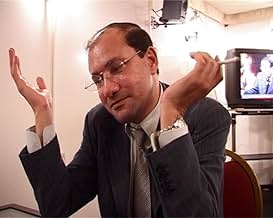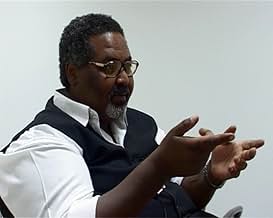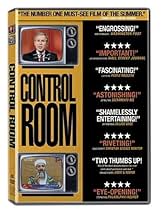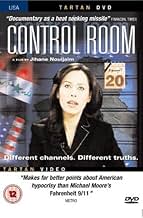VALUTAZIONE IMDb
7,6/10
5339
LA TUA VALUTAZIONE
La percezione della guerra degli Stati Uniti con l'Iraq, con un'enfasi sulla copertura di Al Jazeera.La percezione della guerra degli Stati Uniti con l'Iraq, con un'enfasi sulla copertura di Al Jazeera.La percezione della guerra degli Stati Uniti con l'Iraq, con un'enfasi sulla copertura di Al Jazeera.
- Premi
- 9 vittorie e 10 candidature totali
Josh Rushing
- Self
- (as Lt. Josh Rushing)
George W. Bush
- Self
- (filmato d'archivio)
Donald Rumsfeld
- Self
- (filmato d'archivio)
Recensioni in evidenza
They are a horde of sand monkeys screaming hysterically, jumping up and down, waving their fists in the air, and they all have their heads wrapped in tablecloths stolen from Italian restaurants -- right? Well, not quite, according to this documentary from Noujaim, which focuses on the producers and staff of the much-maligned al Jaziera satellite news channel which broadcasts to the Arab-speaking world.
The reporter we get to know best, a big guy who looks like Luciano Pavarotti in makeup for a performance of Otello, and who speaks English fluently (his wife is an Englishwoman), is like most other reporters of whatever channel or nationality -- practical, cynical, and good humored. He doesn't give us an anti-American diatribe. He's way too cool for that. He's watching, for instance, the tape of a demonstration in which yelling, leaping children surround some Americans entering Baghdad and he's listening to the English translation. The children are shouting "Allah" something or other and the on screen translator comments that the kids are saying "God be with you Americans!" The reporter smiles and turns to the camera, explaining that what the kids are actually saying is, "God damn you Americans." He has a keen sense of irony.
So does another translator who is watching Bush's "Mission Accomplished" speech on live TV and giving the Arabic translation to the audience. When Bush is finally finished telling us how successful we and our allies have been, how the war has ended, the translator shuts off his mike, lowers his face and wordlessly chuckles.
At another point, after the victory, Iraqis are seen breaking into a bank, emerging which armfuls of money, which they then gleefully tear up and toss in the air. Watching this on TV an al Jaziera staff member remarks that these are Kurds and they're tearing up the dough because it's the new Dinar with Saddam's picture, and in that region they've always used the old pre-1991 currency. At the same time, elsewhere, an American newsman (from CNN, I think) is watching the scene and calls to someone to find out what it is these looters are tearing up. Is it money, or what? And when asked at a briefing to explain why these looting incidents are going on in the destroyed and chaotic cities, an American general replies that this was going on under the noses of the Iraqis themselves. (In other words, some Iraqi authority should have put a stop to it.) But the film makers are mistaken if they think that most of this isn't already known to American audiences. The problem isn't so much that American audiences were ignorant of some of these things, but that they preferred the perception to the substance. Take the concept of victory. The perception is "the liberated people" pulling down a statue of the reviled Hussein. That's part of the substance too. Another part of the substance is videotape of dead and bloody American bodies sprawled on a cement floor, a part that, like the coffins arriving at Dover AFB, we'd rather exclude. Al Jaziera showed both scenes.
I don't mean any of this to sound too simple minded. It's a thorny problem. Exactly how do you edit the substance so that what appears in the media is acceptable -- in the sense that it doesn't get you fired or killed. The journalist's code of course is to be "objective," but objectivity itself depends on perception.
A sympathetic Marine captain, seen in several interviews, doing his best to answer unanswerable questions, poses the conundrum in its most basic form. Something like, "I was watching American TV and saw shots of these bodies of dead civilians, including kids, and I thought, that's too bad. Then I ate dinner and went to sleep. Recently I was watching al Jaziera and saw shots of bodies of dead American GIs, and I really got MAD. Then I thought, maybe THEY feel the same way." The officer is a surprisingly earnest guy in an impossible job. He's trying to learn Arabic, is terribly flattered when asked to come home and have dinner with Pavarotti and his English wife. His happiness at being treated amicably is almost palpable.
If you put the wrong material on the air, you're liable to pay for it. Al Jaziera's headquarters in Baghdad was bombed during the war and one of its reporters killed. Another Arab news agency was bombed at the same time, and a hotel too. The financial reporter from al Jaziera was banned from the New York Stock Exchange too. (Not mentioned in this film.) We're going to have to wait for another documentary to explain the reasons for that, I guess.
The reporter we get to know best, a big guy who looks like Luciano Pavarotti in makeup for a performance of Otello, and who speaks English fluently (his wife is an Englishwoman), is like most other reporters of whatever channel or nationality -- practical, cynical, and good humored. He doesn't give us an anti-American diatribe. He's way too cool for that. He's watching, for instance, the tape of a demonstration in which yelling, leaping children surround some Americans entering Baghdad and he's listening to the English translation. The children are shouting "Allah" something or other and the on screen translator comments that the kids are saying "God be with you Americans!" The reporter smiles and turns to the camera, explaining that what the kids are actually saying is, "God damn you Americans." He has a keen sense of irony.
So does another translator who is watching Bush's "Mission Accomplished" speech on live TV and giving the Arabic translation to the audience. When Bush is finally finished telling us how successful we and our allies have been, how the war has ended, the translator shuts off his mike, lowers his face and wordlessly chuckles.
At another point, after the victory, Iraqis are seen breaking into a bank, emerging which armfuls of money, which they then gleefully tear up and toss in the air. Watching this on TV an al Jaziera staff member remarks that these are Kurds and they're tearing up the dough because it's the new Dinar with Saddam's picture, and in that region they've always used the old pre-1991 currency. At the same time, elsewhere, an American newsman (from CNN, I think) is watching the scene and calls to someone to find out what it is these looters are tearing up. Is it money, or what? And when asked at a briefing to explain why these looting incidents are going on in the destroyed and chaotic cities, an American general replies that this was going on under the noses of the Iraqis themselves. (In other words, some Iraqi authority should have put a stop to it.) But the film makers are mistaken if they think that most of this isn't already known to American audiences. The problem isn't so much that American audiences were ignorant of some of these things, but that they preferred the perception to the substance. Take the concept of victory. The perception is "the liberated people" pulling down a statue of the reviled Hussein. That's part of the substance too. Another part of the substance is videotape of dead and bloody American bodies sprawled on a cement floor, a part that, like the coffins arriving at Dover AFB, we'd rather exclude. Al Jaziera showed both scenes.
I don't mean any of this to sound too simple minded. It's a thorny problem. Exactly how do you edit the substance so that what appears in the media is acceptable -- in the sense that it doesn't get you fired or killed. The journalist's code of course is to be "objective," but objectivity itself depends on perception.
A sympathetic Marine captain, seen in several interviews, doing his best to answer unanswerable questions, poses the conundrum in its most basic form. Something like, "I was watching American TV and saw shots of these bodies of dead civilians, including kids, and I thought, that's too bad. Then I ate dinner and went to sleep. Recently I was watching al Jaziera and saw shots of bodies of dead American GIs, and I really got MAD. Then I thought, maybe THEY feel the same way." The officer is a surprisingly earnest guy in an impossible job. He's trying to learn Arabic, is terribly flattered when asked to come home and have dinner with Pavarotti and his English wife. His happiness at being treated amicably is almost palpable.
If you put the wrong material on the air, you're liable to pay for it. Al Jaziera's headquarters in Baghdad was bombed during the war and one of its reporters killed. Another Arab news agency was bombed at the same time, and a hotel too. The financial reporter from al Jaziera was banned from the New York Stock Exchange too. (Not mentioned in this film.) We're going to have to wait for another documentary to explain the reasons for that, I guess.
It's pretty tough to review and rate a documentary like this. Mainly because it's taken almost solely from an Arab perspective: an Arab news media, living in a deeply Arab culture, and run by Arab men and women.
That's not to say that what we see on NBC and Fox News here in the States is any less insightful. Skewed toward the Lazy-Boy recliner news watcher, the American news media is just as blind to its prejudices and half-truths as many other media outlets around the world.
So when I read reviews of this documentary and they lambaste it for being "one-sided", I have to shrug and say, "Yeah, so what news media do you watch?" Covering the Iraq War, Al Jazeera focused on what happened and was happening from inside Bahgdad. A pretty risky proposition, a move that ends up killing one of their correspondents. Looking at the Ba'athists and other political affiliations within the country was interesting and, again, a bit skewed.
The anti-American sentiment can be felt smoldering under the surface of Al-Jazeera, too. But whether this is simply a survival strategy (they do have to live there after the Americans are gone) or real is anyone's guess.
This IS a great documentary to watch, though. Being spoon fed Fox News' version of the war is just as blinding as Al Jazeera's. But after watching CONTROL ROOM, I know now that somewhere between the American TV reports and Al Jazeera, the truth does lie.
That's not to say that what we see on NBC and Fox News here in the States is any less insightful. Skewed toward the Lazy-Boy recliner news watcher, the American news media is just as blind to its prejudices and half-truths as many other media outlets around the world.
So when I read reviews of this documentary and they lambaste it for being "one-sided", I have to shrug and say, "Yeah, so what news media do you watch?" Covering the Iraq War, Al Jazeera focused on what happened and was happening from inside Bahgdad. A pretty risky proposition, a move that ends up killing one of their correspondents. Looking at the Ba'athists and other political affiliations within the country was interesting and, again, a bit skewed.
The anti-American sentiment can be felt smoldering under the surface of Al-Jazeera, too. But whether this is simply a survival strategy (they do have to live there after the Americans are gone) or real is anyone's guess.
This IS a great documentary to watch, though. Being spoon fed Fox News' version of the war is just as blinding as Al Jazeera's. But after watching CONTROL ROOM, I know now that somewhere between the American TV reports and Al Jazeera, the truth does lie.
I'll be the first to admit that this film is good but not great. All politics aside, I was just left hanging in the balance wanting MORE. Though I can appreciate their limited access to outside footage and English-speaking counterparts, certain scenes tended to drag on a bit and left me wondering what could have been.
That said, per my subject heading, I feel that this should be REQUIRED viewing for any concerned citizen grappling with the media coverage and news-spin of this and all other wars. Much like BRAVO's "Anatomy Of A Scene", the unfolding of the 'end of the war' and the subsequent toppling of Saddam's statue in the square both serve as serious examples of Al Jazeera news coverage vs. 'The Big Boys'. It's just completely different when seen through the intelligent, capable eyes of the Al-Jazeera staff than what we're spoon-fed by Fox, et. al. Check it out...... Really.....
That said, per my subject heading, I feel that this should be REQUIRED viewing for any concerned citizen grappling with the media coverage and news-spin of this and all other wars. Much like BRAVO's "Anatomy Of A Scene", the unfolding of the 'end of the war' and the subsequent toppling of Saddam's statue in the square both serve as serious examples of Al Jazeera news coverage vs. 'The Big Boys'. It's just completely different when seen through the intelligent, capable eyes of the Al-Jazeera staff than what we're spoon-fed by Fox, et. al. Check it out...... Really.....
"Control Room" takes a hard look at the Al-Jazeera news network, but on a grander scale shows us how important the role of media is in war. Media is a tool or war, and war a tool of media. There's some disturbing stuff here, and also some raw moments of human emotion (war is hell, and covering war can tear out someone's soul). The makers of this film also show how propaganda can be spewed from both sides (Fox News, anyone?) and no war can be fought intelligently without propaganda and the media. In the end, this is probably the closest thing we will get to an unbiased look at the strife in the Middle East. We the viewers feel sympathy for those innocents caught in the cross-fire and empathy for all sides involved on the battle fields and behind the scenes. Powerful, thought-provoking, educational and debate worthy, there need to be more documentaries like this in times like these.
Two things moved me very much about this film:
The first was Lt Rushing, one of the US military media liaison officers at Centcom. His open-mindedness, fairness and plain decency are very rare to find in any spin doctor, let alone one working for an army during a war. He is a credit to himself, his family and his country, and I sincerely hope he hasn't suffered any professional repercussions for his honesty in this piece.
The second was the man who was the head of Al Jazeera. It was funny when he said he would accept a job at Fox News the second it was offered. But it turned out to be heartbreaking when he said as soon as his children are old enough, he'll send them to the US for education, in order to escape the "Arab nightmare" and live the "American dream". It's so sad that that part of the world is such a mess that even people who love it and have grown up there and are rooting for it recognise that there is little hope there for their children. If only that sentiment could be channelled into finding a solution for the problems in the Middle East.
The first was Lt Rushing, one of the US military media liaison officers at Centcom. His open-mindedness, fairness and plain decency are very rare to find in any spin doctor, let alone one working for an army during a war. He is a credit to himself, his family and his country, and I sincerely hope he hasn't suffered any professional repercussions for his honesty in this piece.
The second was the man who was the head of Al Jazeera. It was funny when he said he would accept a job at Fox News the second it was offered. But it turned out to be heartbreaking when he said as soon as his children are old enough, he'll send them to the US for education, in order to escape the "Arab nightmare" and live the "American dream". It's so sad that that part of the world is such a mess that even people who love it and have grown up there and are rooting for it recognise that there is little hope there for their children. If only that sentiment could be channelled into finding a solution for the problems in the Middle East.
Lo sapevi?
- Citazioni
Lt. Josh Rushing: It makes me hate war, but it doesn't make me believe that we're in a world that can live without war yet.
- Colonne sonoreControl Room Intro Theme
Written by Kinan Azmeh and Dinuk Wijeratne on a theme by Béla Bartók (as Bartok)
Performed by Kinan Azmeh and Dinuk Wijeratne
Courtesy of Kinan Azmeh and Dinuk Wijeratne
I più visti
Accedi per valutare e creare un elenco di titoli salvati per ottenere consigli personalizzati
Dettagli
- Data di uscita
- Paese di origine
- Lingue
- Celebre anche come
- Контрольная комната
- Azienda produttrice
- Vedi altri crediti dell’azienda su IMDbPro
Botteghino
- Lordo Stati Uniti e Canada
- 2.589.616 USD
- Fine settimana di apertura Stati Uniti e Canada
- 27.125 USD
- 23 mag 2004
- Lordo in tutto il mondo
- 2.724.826 USD
Contribuisci a questa pagina
Suggerisci una modifica o aggiungi i contenuti mancanti



